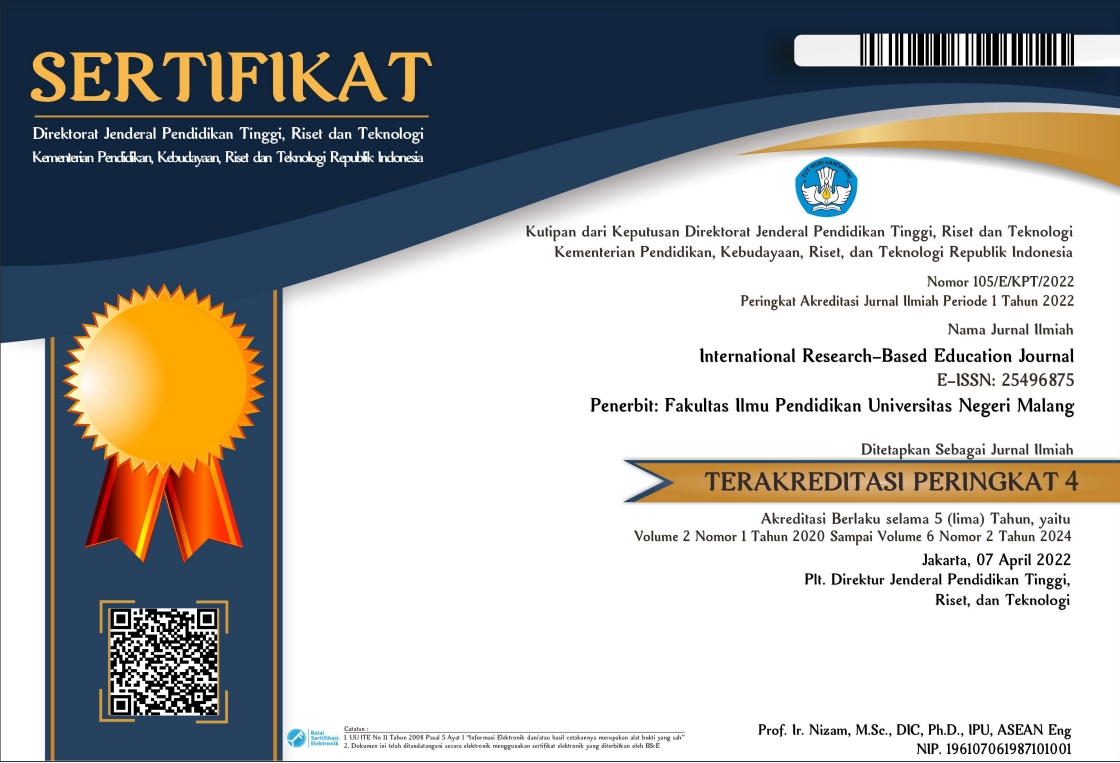School-based Factors Contributing to Students’ Indiscipline Behavior at Public Schools
Abstract
This research investigates the School-based factors contributing to students' indiscipline behavior at public schools. The researcher uses a qualitative research approach method. Therefore, the method involves synthesizing existing literature related to this topic. The article delves into the complexity of indiscipline, identifying school-based factors which include School Leadership, and Administration, Curriculum, and Teaching Methods, Poor Teachers Students Relationship, Overcrowded Classroom, School Climate and Culture, Curriculum and Teaching Methods Limited Parental Involvement as causes that disrupt a conducive learning environment. Indiscipline encompasses actions deviating from accepted standards, leading to disorder and misconduct in various settings, especially public schools. In educational settings, it involves students disregarding rules, disruptive behavior, and violating codes of conduct. Indiscipline poses challenges to education systems and student development. The study identifies school-based factors which include crowded classrooms, lack of effective school leadership, lack of motivation, and many more as the most problematic school-based factors that influence students' indiscipline behavior at public schools. The article emphasizes the ongoing need for efforts from educational stakeholders to improve the situation.
Keywords
Full Text:
PDFReferences
Ashadi, F., Supriatna, D., Haris, M., Hasanah, U., & HinayatulohI, A. (2023). The Analysis of Strategic Role of Student Association in Improving Discipline Attitude and Forming Quality of Graduates. Journal on Education, 5(4), 12239–12245. https://doi.org/10.31004/joe.v5i4.2193
Azizi, Y., Jamaludin, R., Shahrin, H., Mohd. Ali, I., Raja Roslan, R. A. R., & Noordin, Y. (2009). Discipline Problems among Secondary School Students in. European Jounal of Social Sciences, 11(4), 659–675.
Blandina, Y. A., & Leandry, L. (2021). Controlling Students’ Indiscipline in Changing Environment: Secondary School Teachers’ Perspectives in Morogoro Municipality-Tanzania. International Journal of Education and Research, 9(10), 83–94. www.ijern.com
Carter Andrews, D. J., & Gutwein, M. (2020). Middle school students’ experiences with inequitable discipline practices in school: The elusive quest for cultural responsiveness. Middle School Journal, 51(1), 29–38. https://doi.org/10.1080/00940771.2019.1689778
Chewen, J., Munyua, J., & Ogoma, S. (2020). Effects of Schools’ Physical Infrastructure on Student Discipline in Secondary Schools in Eldoret East Sub-County, Kenya. Scholars Journal of Arts, Humanities and Social Sciences, 8(6), 308–314. https://doi.org/10.36347/sjahss.2020.v08i06.003
Clifford, T. . (2012). Teachers perspectives of leaners indiscipline on grade 12 academic perfprmance: A case of the Libode district. Doctoral Dissertation, Walter Sisulu University, 9(2).
Cribb Fabersunne, C., Lee, S. Y., McBride, D., Zahir, A., Gallegos-Castillo, A., Lewinn, K. Z., & Morris, M. D. (2023). Exclusionary School Discipline and School Achievement for Middle and High School Students, by Race and Ethnicity. JAMA Network Open, 6(10), E2338989. https://doi.org/10.1001/jamanetworkopen.2023.38989
da Silva, A. M. P. M., Negreiros, F., & Albano, R. M. (2017). Indiscipline at public school: Teachers’ conceptions on causes and intervention. International Journal of Research in Education and Science, 3(1), 1–10. https://doi.org/10.21890/ijres.267354
Enefu, S. M., Obaka, H. P., Okaforcha, C. C., & Haruna, M. M. (2019). Effects of Indiscipline on Academic Performance of Secondary School Students in Dekina L . G . a . of Kogi State. British Journal of Guidance & Counselling, 1(1), 37–46.
Gagnon, J. C., Gurel, S., & Barber, B. R. (2017). State-level analysis of school punitive discipline practices in Florida. Behavioral Disorders, 42(2), 65–80. https://doi.org/10.1177/0198742916688652
Irvin, L. K., Tobin, T. J., Sprague, J. R., Sugai, G., & Vincent, C. G. (2004). Validity of office discipline referral measures as indices of school-wide behavioral status and effects of school-wide behavioral interventions. Journal of Positive Behavior Interventions, 6(3), 131–147. https://doi.org/10.1177/10983007040060030201
Isa, B., Gatawa, M., Musa, B., Abdul’Aziz, N., Hassan, A., & Jagaba, M. (2021). Students’ Indiscipline in Higher Educational Institutions of Sokoto State: the Forms, Causes and Management Approaches. International Journal of Advanced Academic Research, February, 1–13. https://doi.org/10.46654/ij.24889849.a61245
Jekayinfa, A. (2013). Discpline and indiscipline in higher educational system. A Paper Delivered at the Workshop on Improved Teaching and Learning Methods in the Higher Education System Organised by the Afe Babalola University, Ado-Ekiti, Nigeria 9th – 12th April, 2013, 1–14.
Jeruto W, Gichohi P, and M. E. (2021). The Relationship between Rules and Regulations and Students ’ Discipline in Public Schools in Eldama Ravine. Journal of Education, 4(3), 93–104. http://41.89.31.5/bitstream/handle/123456789/1229/Winnie Jeruto- Published article 5th August 2021 %281%29.pdf?sequence=1&isAllowed=y
Lawal, A., Oloyin, A., & Sadiq, H. M. (2019). Devising productive measures for curbing indiscipline in Nigerian Secondary Schools. African Journal of Educational Research and Development (AJERD), 12(2), 183–190.
Mahardika, B. A., Kusna, A., Nugraheni, D. R., Eriyani, D., Yulindasari, N. O., Taftania, S., Sholihah, V. M., & Benty, D. D. N. (2020). Building School Culture to Establish Students Character. 508(Icite), 428–433. https://doi.org/10.2991/assehr.k.201214.272
Matimba, H. (2023). Strategies Employed by Schools to Mitigate Pupil Indiscipline in Selected Secondary Schools of Choma District, Zambia. International Journal of Social Science and Education Research Studies, 03(04), 736–743. https://doi.org/10.55677/ijssers/v03i4y2023-26
Mwakibinga, L. E. (2018). School environment and students indiscipline in secondary schools in Nyamagana District, Tanzania. Kampala Uganda, 10–27.
Ndamani, P. L. (2008). Factors Contributing to Lack of Discipline in Selected Secondary Schools in the Mangaung Area of Bloemfontein and Possible Solutions. Interim : Interdisciplinary Journal, 7(2), 177–197.
Ndambuki, J. N. (2016). Influence Of Board Of Management Members’ Conflict Management Styles On Student’S Discipline In Public Secondary Schools In Machakos Sub-County, Kenya.
Ngwokabuenui, P. Y. (2015). Students’ Indiscipline: Types, Causes and Possible Solutions: The Case of Secondary School in Cameroon. Journal of Education and Practice, 6(22), 64–71. www.iiste.org
Ndungo, I., Asiimwe, L., & Biira, M. (2020). The relationship between school- based practices and students ’ disciplin e evidence from secondary schools in Kabarole District. Academia Journal of Education Research, 8(March), 84–91. https://doi.org/10.15413/ajer.2020.0104
Njoroge, P. M., & Nyabuto, A. N. (2014). Discipline as a Factor in Academic Performance in Kenya. Journal of Educational and Social Research, 4(1), 289–308. https://doi.org/10.5901/jesr.2014.v4n1p289
Oyem, B., & Arusuayine, J. (2016). Emerging Challenges of Indiscipline and Remedial Measures Among Principals, Teachers and Students of Public Secondary Schools in Delta and Ondo States, Nigeria.
Purnami, A. A. (2016). THE IMPACT OF INDISCIPLINE CASES ON LEARNER’S ACADEMIC PERFORMANCE. A CASE STUDY OF KASESE MUNICIPALITY UGANDA. Analisis Nilai Moral Dalam Cerita Pendek Pada Majalah Bobo Edisi Januari Sampai Desember 2015, 2016.
Redempta, E. N. (2010). METHODS USED TO ENHANCE STUDENTS DISCIPLINE IN PUBLIC SECONDARY SCHOOLS IN KAMUKUNJI DIVISION NAIROBI PROVINCE , KENYA BY A RESEARCH PROJECT SUBMITTED TO THE SCHOOL OF EDUCATION IN PARTIAL FULFILMENT OF THE REQUIREMENTS FOR THE DEGREE OF MASTERS IN Kenyat. May.
Salsa, A., Amalia, A., Utomo, A. C., & Surakarta, U. M. (2023). CULTIVATION THE CHARACTERS OF DISCIPLINE AND HONESTY THROUGH. 5(2), 323–340. https://doi.org/10.37680/scaffolding.v5i2.3036
Silva, L., & Matos, D. (2017). Indiscipline in Pisa : between intra- and extra-school factors. 382–414.
Simuforosa, M., & Rosemary, N. (2014). Learner indiscipline in schools. Review of Arts and Humanities, 3(2), 79–88. http://rah-net.com/journals/rah/vol_3_No_2June_2014/6.pdf
Sprague, J., Nishioka, V., & Smith, S. G. (2007). Safe schools, positive behavior supports, and mental health supports: Lessons learned from three safe schools/healthy students communities. Journal of School Violence, 6(2), 93–115. https://doi.org/10.1300/J202v06n02_06
Sprague, J. R. (2020). School wide positive behavior interventions and supports : Proven practices and future directions. January.
Steve, A. O., & Charles, O. O. (2020). Indiscipline Model and Academic Performance of Secondary School Students in Ibadan : Implication for Educational Foundation in Nigeria. International Journal of Research and Innovation in Social Science (IJRISS), IV(Viii), 450–460. https://www.rsisinternational.org/journals/ijriss/Digital-Library/volume-4-issue-8/450-460.pdf
Waithaka T.K. (2017). Indiscipline in Public Secondary Schools: the Case of Nairobi County. University of Nairobi E-Repository, November.
DOI: http://dx.doi.org/10.17977/um043v6i2p199-233
Refbacks
- There are currently no refbacks.

This work is licensed under a Creative Commons Attribution-NonCommercial-ShareAlike 4.0 International License.










1.png)


